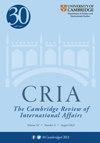Epistemic security and the redemptive hegemony of magical realism
IF 1.3
3区 社会学
Q2 INTERNATIONAL RELATIONS
引用次数: 0
Abstract
AbstractThis article develops the concept of epistemic security as a form of ontological security. Epistemic security denotes a sense of redemptive hegemony that derives from participation in ritualised schemes of epistemic authority. Such schemes are strategically identified and cultivated by experts turned guardian experts who ritualise knowledge production to generate collective empowerment. Epistemic security troubles the notion of modern expertise and reflexive agency in ontological security studies. Guardian experts embed knowledge formation in tradition rather than methodological scepticism and disavow epistemic violence of their interpretative frameworks. I develop the argument in engagement with ‘magical realism’—a ritualised script of the realist International Relations theory in the pro-regime Russian academic discourse. Through ritual mastery, the guardian experts of magical realism perform ‘magic slippage’ from scientific to sacred frames to render Russia’s war on Ukraine hegemonically redemptive, as a scientifically derived, historically preordained, and politically prudent act of a great power. AcknowledgementsSpecial thanks to the former and current editors of Cambridge Review of International Affairs, in particular to Italo Brandimarte and Niyousha Bastani for curating this Special Issue, and to the three anonymous reviewers for their thorough engagement and scholarly care. I benefitted from discussing different aspects of this paper with the following colleagues: Felix Ciută, Philip Conway, Thijs Korsten, Dominik Sipiński, Iver Neumann, Raquel Beleza da Silva, Anatoly Reshetnikov, Vladimir Ogula, Beni Kovacs, Adam Pontus, Maria Mälksoo, Catarina Kinnvall, and Jennifer Mitzen. Thanks also to Olga Ogula for double-checking my translations and transliterations, and to Paul Blamire for consultation on theology and the English language. All remaining errors are mine.Disclosure statementNo potential conflict of interest was reported by the author(s).Notes1 For the complete list of lectures, see Andrey Sushentsov’s Telegram channel https://t.me/asushentsov/57. Accessed 3 June 2023.2 On the great power narrative as a tenacious ideational anchorage in Russia’s foreign policy see e.g., Reshetnikov (Citation2023); Narozhna (Citation2022); Curanović (Citation2021); Neumann (Citation2015, Citation2016); Müller (Citation2009).3 Twitter thread by Anton Barbashin (@ABarbashin) from 19 April 2022, https://twitter.com/ABarbashin/status/1516491940933652481?t=puoFuUBiqSCmipqAdC1A1w&s=03. Accessed 3 June 2023.4 Lecture by Yevgeniy Minchenko, ‘Информационные операции и нарративы сторон Украинского кризиса’ [Informatsionnyye operatsii i narrativy storon Ukrainskogo krizisa.] Information operations and narratives of the parties of the Ukrainian crisis. Available at: https://www.youtube.com/watch?v=js13eJpMggo&t=4s. Accessed 3 June 2023. This part starts at ca. 45:50. All translations from Russian are my own.5 Note the use of the concept of epistemological security by Adler and Drieschova (Citation2021), which they define as ‘the experience of orderliness and safety that results from people’s and institutions’ shared understandings of their common-sense reality’ (Ibid, 359). They relate epistemological security to ontological security but do not conceptualise it as such and valorise epistemological security as a condition for rational truth-finding and warranted knowledge production in liberal societies and the International Liberal Order more broadly. Epistemic security conceptualised with reference to redemptive hegemony emphasises instead the potential and enactment of epistemic violence through cultivation of sacred epistemic schemes. See also disambiguation between epistemological security and ‘epistemic security’ (Gertler Citation2017) understood as ‘the strength of the epistemic claims on behalf of self-knowledge’, cited in Adler (Citation2019, 290).6 Yevgeniy Minchenko is an expert in political communication. See his profile at https://minchenko.ru/en/about/president/. Accessed 3 June 2023.7 See profile at https://english.mgimo.ru/people/sushentsov. Accessed 13 May 2023.Sushentsov is importantly also the programme director of the Valdai Discussion Club,a major regime-oriented think tank established to disseminate knowledge about Russia globally. In cooperation with William Wohlforth, a distinguished scholar of neoclassical realism who served as the scientific director of the Laboratory of International Process Analysis at MGIMO (see https://english.mgimo.ru/news/wohlforth; https://mgimo.ru/about/news/inno/sozdan-nauchnyy-tsentr-lamp/, accessed 13 May 2023.), Sushentsov has pursued a publication strategy internationalising Russian IR (e.g. Sushentsov and Wohlforth Citation2020; Fomin et al. Citation2021).8 On performative ‘leaps of faith’ as connected to routines in ontological security seeking, see also Arfi (Citation2020).9 The segment starts at 22:15.10 As an architectural feature, an atlas is a support sculpted in the form of a muscular man. It also evokes Atlas, the Titan in Greek mythology, who was forced to hold the sky on his shoulders for eternity.11 See, for example, the following clip, https://www.youtube.com/watch?v=x8bX6SPlrWs. Accessed 12 March 2023.12 This set of demands is now known as the December 2021 ultimatum, see ‘Russia issues list of demands it says must be met to lower tensions in Europe’, The Guardian, 17 December 2021, https://www.theguardian.com/world/2021/dec/17/russia-issues-list-demands-tensions-europe-ukraine-nato. Accessed 2 June 2023.Additional informationNotes on contributorsXymena KurowskaXymena Kurowska holds a doctorate in social and political sciences from European University Institute in Florence and works as Associate Professor of International Relations at Central European University in Vienna. Email: kurowskax@ceu.edu认识安全与魔幻现实主义的救赎霸权
摘要本文将认识论安全的概念发展为本体论安全的一种形式。认知安全指的是一种源于参与认知权威的仪式化方案的救赎霸权感。这些计划是由由专家转变为守护者的专家战略性地确定和培养的,他们将知识生产仪式化,以产生集体赋权。在本体论安全研究中,认知安全困扰着现代专业知识和反身代理的概念。卫报专家将知识形成嵌入传统,而不是方法论怀疑主义,并否认其解释框架的认知暴力。我在与“魔幻现实主义”的接触中发展了这一论点——在亲政权的俄罗斯学术话语中,现实主义国际关系理论的仪式化脚本。通过仪式的掌握,魔法现实主义的守护专家们表演了从科学到神圣框架的“魔法滑落”,使俄罗斯对乌克兰的战争成为一种霸权救赎,作为一种科学衍生的、历史上注定的、政治上谨慎的大国行为。特别感谢《剑桥国际事务评论》的前任和现任编辑,特别是Italo Brandimarte和Niyousha Bastani策划了本期特刊,以及三位匿名审稿人的全面参与和学术关怀。我从与以下同事讨论本文的不同方面中受益:Felix ciutei, Philip Conway, Thijs Korsten, Dominik Sipiński, Iver Neumann, Raquel Beleza da Silva, Anatoly Reshetnikov, Vladimir Ogula, Beni Kovacs, Adam Pontus, Maria Mälksoo, Catarina Kinnvall和Jennifer Mitzen。还要感谢Olga Ogula仔细检查我的翻译和音译,以及Paul Blamire在神学和英语语言方面的咨询。所有剩下的错误都是我的。披露声明作者未报告潜在的利益冲突。注1完整的讲座列表,请参见Andrey Sushentsov的Telegram频道https://t.me/asushentsov/57。关于大国叙事作为俄罗斯外交政策中顽强的意识形态锚点,参见Reshetnikov (Citation2023);Narozhna (Citation2022);Curanović(Citation2021);Neumann (Citation2015, Citation2016);穆勒(Citation2009)。3Anton Barbashin (@ABarbashin)于2022年4月19日发的推特帖子https://twitter.com/ABarbashin/status/1516491940933652481?t=puoFuUBiqSCmipqAdC1A1w&s=03。6月3日2023.4访问Yevgeniy Minchenko讲座,“ИнформационныеоперацииинарративысторонУкраинскогокризиса的[Informatsionnyye operatsii我narrativy storon Ukrainskogo krizisa。乌克兰危机各方的信息操作和叙述。可在:https://www.youtube.com/watch?v=js13eJpMggo&t=4s。2023年6月3日访问。这部分大约从45:50开始。所有的俄语翻译都是我自己做的请注意Adler和Drieschova (Citation2021)对认识论安全概念的使用,他们将其定义为“人们和机构对其常识性现实的共同理解所产生的有序和安全体验”(同上,359)。他们将认识论安全与本体论安全联系起来,但没有将其概念化,而是将认识论安全作为理性真理发现的条件,并将其作为自由社会和国际自由秩序中更广泛的有保障的知识生产。与救赎霸权相关的认知安全概念反而强调了通过培养神圣的认知方案而产生的认知暴力的潜力和实施。另见认识论安全和“认识论安全”之间的消义(Gertler Citation2017),理解为“代表自我知识的认识论主张的力量”,引自Adler (Citation2019, 290)叶夫根尼·明琴科是政治传播方面的专家。请访问https://minchenko.ru/en/about/president/查看他的个人资料。访问日期:2023.7 6月3日。2023年5月13日生效。重要的是,苏申索夫还是瓦尔代讨论俱乐部(Valdai Discussion Club)的项目主管。瓦尔代讨论俱乐部是一个以政权为导向的大型智库,旨在向全球传播有关俄罗斯的知识。与新古典现实主义的杰出学者William Wohlforth合作,他曾担任MGIMO国际过程分析实验室的科学主任(见https://english.mgimo.ru/news/wohlforth;https://mgimo.ru/about/news/inno/sozdan-nauchnyy-tsentr-lamp/, 2023年5月13日访问),Sushentsov一直在追求俄罗斯国际关系国际化的出版战略(例如Sushentsov和Wohlforth Citation2020;Fomin等人。Citation2021)。8关于与本体论安全寻求中的例程相关的表演性“信仰飞跃”,参见Arfi (Citation2020)这部分在22:15开始。 作为一个建筑特色,地图集是一个雕刻成肌肉发达的人的支撑。它也让人联想到希腊神话中的巨人阿特拉斯,他被迫永远把天空扛在肩上例如,请看下面的片段https://www.youtube.com/watch?v=x8bX6SPlrWs。这一系列要求现在被称为2021年12月最后通牒,参见“俄罗斯提出的要求清单,它说必须满足以缓解欧洲的紧张局势”,卫报,2021年12月17日,https://www.theguardian.com/world/2021/dec/17/russia-issues-list-demands-tensions-europe-ukraine-nato。2023年6月2日访问。作者简介:xymena Kurowska拥有佛罗伦萨欧洲大学学院的社会和政治学博士学位,并在维也纳中欧大学担任国际关系副教授。电子邮件:kurowskax@ceu.edu
本文章由计算机程序翻译,如有差异,请以英文原文为准。
求助全文
约1分钟内获得全文
求助全文

 求助内容:
求助内容: 应助结果提醒方式:
应助结果提醒方式:


